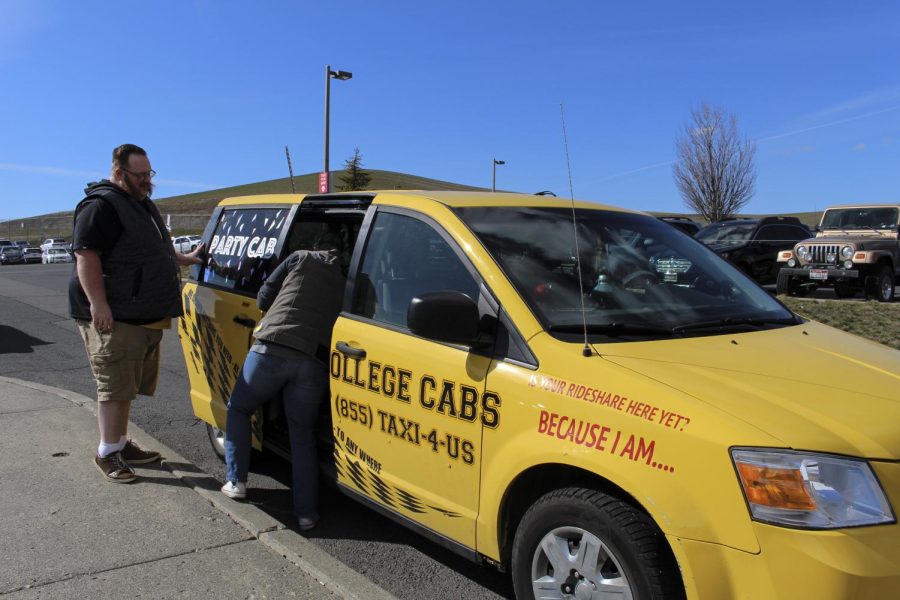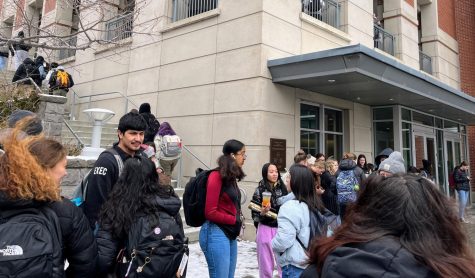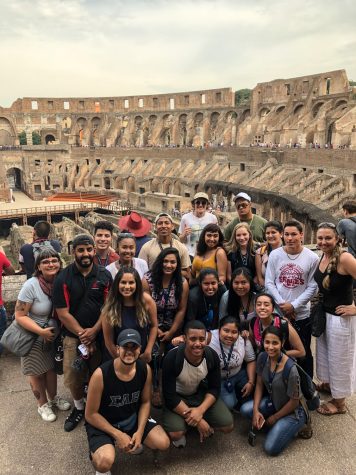Cab drivers reflect on uncertainty of business
Cancellation of events like Mom’s Weekend and WSU’s commencement leads to drop in revenue
College Cabs employees disinfect their cabs after each passenger exits. Drivers handle cards with gloves or wipes to protect themselves and their passengers. Drivers also talk to passengers to make them comfortable.
As the fear of the coronavirus spreads, gig economy workers ruminate in the uncertainty of the future.
Rob Borden, owner of College Cabs and Auto Repair at the Hive, said he has seen over an 80 percent reduction in revenue for College Cabs.
The company combined its drivers into fewer vehicles to adjust to the lack of classes and university events, he said. College Cabs reduced its fleet to four vehicles because it is not financially feasible to run all 12 cabs at this time.
Borden said his businesses usually support one another financially but now both are hurting. He applied for emergency funds to sustain the businesses, but he is fearful of what the future looks like if this pandemic worsens.
Borden said he is worried that if College Cabs does not bounce back from their losses quickly enough, a competitor will take its place.
Greg Taylor, College Cabs manager, said events such as Mom’s Weekend, which generated about 10 percent annual gross income, and WSU’s commencement are a main source of revenue for cab drivers.
“I will admit [the drivers are] all pretty scared,” Taylor said. “We don’t know what the WSU closures are going to mean […] this has never happened before.”
College Cabs has been a 24-hour service for seven years and the fleet’s phones never went uncovered, he said. This is the first time in a long time that the business may reduce its hours of operation.
Up until winter break, drivers felt financially secure because they were making a reasonable income, he said. Currently, there are drivers wondering if they will be able to pay their rent.
In spring last year, the cab drivers would have already received around 150 requests for rides for the day, Taylor said. Now, the phone is commonly silent for an hour, which was rare before the COVID-19 pandemic.
“I need to know that [my drivers] are getting a fair wage,” Taylor said. “I need to know that they’re able to pay for health insurance and they’re able to do the things that a person needs to do without working 100 hours a week.”
Some drivers left College Cabs because they cannot make enough money and others are following social distancing guidelines, Borden said.
Those engaged in the gig economy cannot risk taking time off work, Taylor said. Due to this, most cab drivers are not qualified for unemployment benefits or sick leave. Drivers at College Cabs are wondering if they are going to be able to pay rent or keep their power on.
“Well, I’m almost 40 years old and for the first time in 20 years I’m considering calling my dad to borrow money to pay the bills,” Taylor said.
CJ Maxwell, College Cabs manager, said there is more to working for the business than just driving around. She said the core of their job is to make sure people laugh and feel safe while they are using their service.
Drivers disinfect their cab after each passenger exits, as well as handle cards with gloves or wipes, Maxwell said. Doing this ensures the safety of the customers and drivers. The drivers also spend time talking and joking with customers to make them comfortable.
“Why get up in the morning if you’re just going to hate your job?” Maxwell said.
Ryon Ownbey, a College Cab driver, said he is looking for a second job to support him and his family, which has proven to be difficult at this time because of all of the temporary business closures.
There is a social aspect to driving a cab, especially in Pullman, Ownbey said. If there is something that requires him to stay home from his job, he will miss learning about what is happening in the world through his conversations with customers.
“That’s a big part of my day: [thinking] ‘What stories am I going to hear today’ and what can I tell people,” Ownbey said. “That being reduced hurts.”
Ownbey said the future is not completely discouraging, as he believes the cab service will stay alive.
“You roll with it,” Ownbey said. “Go and do the best you can.”
College Cabs will shift its focus to delivery in order to adapt to the changing environment.
Delivery services cost $15 and there is a minimum of three items, Taylor said. The goods can vary from food, tampons or hand sanitizer, he said. The cost of goods will not be inflated. Drivers will leave the purchased items on the customer’s door handle with minimal contact.
The drivers can cover small orders and that charge will be included in the total fee, Taylor said. For larger orders, College Cabs asks people to order from the vendors ahead of time and drivers will pick it up. Then they will leave the purchased items on the customer’s door handle to maintain minimal contact.
The cab service is also attempting to work with local businesses to create new pathways to sustain their operations, Taylor said. However this may not work, as restaurants and stores are trying to avoid laying off their employees by having them do delivery, Borden said.
“We’re going to do what we have to do to survive,” Taylor said.

Lauren is a senior journalism major from Anchorage, AK. She was the mint editor in fall 2018.














